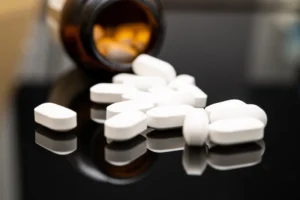Have you ever had trouble sleeping and poured yourself a few extra glasses of wine to “help”? Maybe you were grieving after a loss, so you went out to “take your mind off things” and drank a lot or did drugs at home to “relax.” If these behaviors sound familiar, then you have some experience with self-medicating.
What does self-medicating look like? It looks like any attempt to withdraw, hide, or otherwise mask symptoms of pain or a greater emotional or physical issue that should be dealt with through healthy, safe ways.
What is Self-Medicating?
Self-medicating is when you turn to something, whether it is a hobby or a substance or even an avoidance technique, in order to temporarily mask, diminish, or hide symptoms of an underlying issue.
What Does Self-Medicating Look Like?
Self-medicating looks like any activity or substance you turn to when challenging situations arise.
This can include:
- Going for a long run each time you get a distressing phone call, get in a fight with a spouse, or experience any other strong emotions
- Drinking to mask pain or feel “normal” when you otherwise feel terrible
- Using drugs to sleep or to control feelings about a traumatic event, of a memory you wish you didn’t have, or of pain you experience now
There are many reasons people self-medicate. Here are some examples:
- Someone might not realize they have trauma from childhood, and as such, they get particularly irritable and distressed when they take calls from their family. They don’t communicate these feelings well and instead turn to self-medication to make them go away.
- Someone might be dealing with unprocessed PTSD, and they mask the symptoms with lots of drinking at night to stop the nightmares and insomnia and then lots of caffeine during the day to compensate for poor sleep.
- Someone might have an underlying mental health condition like an anxiety disorder or depressive disorder which may not be diagnosed, and they are dealing with the symptoms in whatever way they know how.
Why is Self-Medicating Dangerous?
While it might not seem dangerous to, for example, go for a run each time you are upset, there are still dangers to this type of behavior. Even something as purportedly healthy as exercise can lead to addictive behaviors and avoidance.
If, for example, you always run when you get in a fight with your spouse or have a stressful day or work, it might mean you are not staying to communicate or to learn about why you are stressed or how to deal with it safely.
Self-medicating with alcohol or drugs means you have an underlying issue that you are not getting treated the right way. This is dangerous, not only because it means you might not be dealing with the underlying emotions, triggers, or trauma, but also because you can develop an addiction.
Addiction from self-medicating can make changes to the way your brain works. These changes to your neurobiology can lead to secondary issues like the development of depressive or anxiety disorders if you didn’t previously have them. It can also make the symptoms you are trying to mask even worse.
Overcoming Self-Medicating with Ava Recovery
If you have asked, “What does self-medicating look like?” and realized that you share some of the signs, it might be time to get professional help.
You can overcome self-medicating habits and get the right treatment with centers like Ava Recovery. Our outpatient drug rehab in Texas is centered on the idea that everything you do to self-medicate is an attempt to meet your deepest needs. Our residential treatment center offers ways you can meet those needs without relying on drugs or alcohol.
We meet you where you are, offering programs like:
-
- DBT and IFS group therapy
- Trauma-informed treatment
While at our facility, you can learn healthy coping mechanisms for stress or personalized trigger identification and have your meals made by our professional chef, with time to swim in our swimming pool or use our rec room.
Overall, self-medicating can be dangerous because it can lead to addiction. Moreover, it prevents you from processing the emotions behind your self-medication. With our team, you can get detox services and residential care that will give you the help you really need.
Call Ava Recovery today to learn more about overcoming self-medicating techniques.






